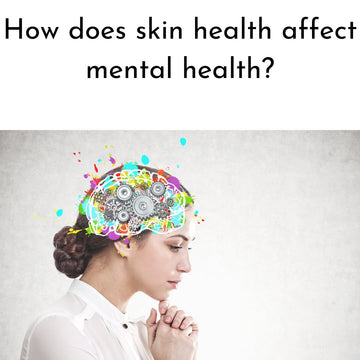By Dr. Nirvana S. Pillay, Medical Scientist & Founder of Nirvana Natural Bliss
Our skin is not just a physical barrier that protects us from external factors. It also plays a crucial role in our mental health and well-being. Our skin is often referred to as our "second brain" because of the close connection between our skin and our brain. In this blog, we will explore the relationship between skin health and mental health and how taking care of our skin can have a positive impact on our mental health.
The impact of skin conditions on self-esteem
The appearance of our skin can significantly impact our self-esteem and confidence. Many people with skin conditions, such as acne, eczema, and psoriasis, suffer from low self-esteem and self-confidence, which can lead to anxiety and depression. The constant worry about how their skin looks can make it challenging to socialise and engage in activities, leading to isolation and loneliness. A study published in the International Journal of Dermatology by Cortés et al,. highlight the importance of mental health care for patients with skin disease. They report that people with acne vulgaris, atopic dermatitis , psoriasis and other visible skin lesions are more likely to develop anxiety, depression and even ideas of suicide that potentially can severely affect the person's health state and quality of life.
Research has shown that individuals with acne are more likely to suffer from depression and anxiety than those with clear skin. Acne can affect a person's self-esteem and self-worth, leading to negative thoughts and feelings about themselves. Furthermore, the visible signs of skin conditions can lead to social stigma, discrimination, and bullying, which can further impact mental health.
On the other hand, taking care of our skin and maintaining its health can boost our self-esteem and confidence. When our skin looks and feels good, we feel good about ourselves, leading to better mental health and well-being. Using skincare products, such as moisturisers and sunscreen, can help to improve the appearance of our skin, leading to improved self-confidence.
Skin health and its connection to stress
Epidemiological evidence has established that stress and emotional states can predispose and/or exacerbate many skin conditions, including but not limited to acne vulgaris, chronic itch, urticaria (hives), atopic dermatitis (eczema), psoriasis, vitiligo, and alopecia areata (patchy hair loss).
Stress is a common problem that can have a negative impact on our mental health. It can cause a wide range of physical and emotional symptoms, including anxiety, depression, and irritability. When we are stressed, our body releases cortisol, a hormone that can lead to inflammation, which can exacerbate skin conditions such as acne, eczema, and psoriasis.
In addition, stress can also cause our skin to become dry, itchy, and irritated. When we are stressed, our body releases histamine, a chemical that can cause itching and inflammation. This can worsen skin conditions such as eczema, leading to a vicious cycle of stress and skin problems.
Therefore, taking care of our skin can help to reduce stress and improve our mental health. Skincare rituals, such as massages, facials, and baths, can help to promote relaxation and reduce stress levels. In addition, using skincare products that contain ingredients such as lavender, chamomile, and rose can have a calming effect on our skin and help to reduce stress levels.
Skin health, sleep, and their influence on mental health
Sleep is essential for our physical and mental health. It helps our body to repair and regenerate, leading to better overall health and well-being. However, when we suffer from skin problems such as eczema or psoriasis, it can be challenging to get a good night's sleep. These conditions can cause itching, discomfort, and pain, leading to insomnia and sleep deprivation.
This study looked at how sleep affects the skin in a group of 32 Korean women in their 40s. They found that when these women only slept 4 hours a night for six consecutive nights, their skin became less hydrated, lost its glossiness, and developed more wrinkles and elasticity problems. Interestingly, elasticity (how firm the skin is) was the most affected by the lack of sleep, suggesting that prolonged sleep deprivation can make the skin less elastic compared to other skin features.
Furthermore, sleep deprivation can also have a negative impact on our skin health. When we don't get enough sleep, our body releases cortisol, a hormone that can cause inflammation and break down collagen, leading to premature aging and wrinkles. In addition, sleep deprivation can also cause our skin to become dull, dry, and dehydrated, leading to a tired and aged appearance.
Therefore, taking care of our skin can help to improve our sleep and promote better mental health. Using skincare products that contain ingredients such as chamomile and lavender, can have a calming effect on our skin and help to promote sleep. In addition, maintaining a consistent skincare routine can help to improve the appearance of our skin, leading to better self-esteem and confidence, which can also improve our sleep.
References
Cortés H, Rojas-Márquez M, Del Prado-Audelo ML, Reyes-Hernández OD, González-Del Carmen M, Leyva-Gómez G. Alterations in mental health and quality of life in patients with skin disorders: a narrative review. Int J Dermatol. 2022 Jul;61(7):783-791. doi: 10.1111/ijd.15852. Epub 2021 Aug 17. PMID: 34403497.
Sun MD, Rieder EA. Psychosocial Stress and Mechanisms of Skin Health: A Comprehensive Update. J Drugs Dermatol. 2021 Jan 1;20(1):62-69. doi: 10.36849/JDD.5608. PMID: 33400410.
Jang SI, Lee M, Han J, Kim J, Kim AR, An JS, Park JO, Kim BJ, Kim E. A study of skin characteristics with long-term sleep restriction in Korean women in their 40s. Skin Res Technol. 2020 Mar;26(2):193-199. doi: 10.1111/srt.12797. Epub 2019 Nov 6. PMID: 31692145.





